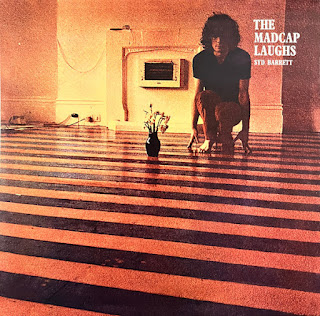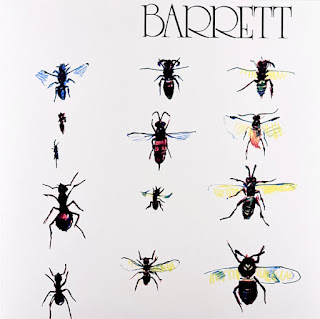Singer, songwriter, and guitarist Roger Keith “Syd” Barrett co-founded classic rock legends Pink Floyd in 1965 with bassist Roger Waters, keyboardist Richard Wright, and drummer Nick Mason. Barrett was the band’s early frontman and main songwriter, exploring the depths of psychedelic expression in words and music and introducing free-form fretwork, distortion, and feedback to the vocabulary of rock music. For all of his influence, Barrett’s tenure with the band was incredibly short – four hit singles, the band’s 1967 debut LP The Piper At the Gates of Dawn and studio leftovers comprising part of their sophomore effort, 1968’s A Saucerful of Secrets – before he was begrudgingly removed from the band in early 1968 for his excessive LSD usage which, along with the stress of the band’s unexpected fame and commercial express, illuminated Barrett’s underlying mental illness.
The Solo Works of Syd Barrett
Barrett was essentially replaced in Floyd by singer/guitarist David Gilmour, a college friend of Syd’s who joined the band in late 1967 as its fifth member. Barrett launched a short-lived solo career with the 1969 single “Octopus,” subsequently releasing his solo debut, The Madcap Laughs, in January 1970. He followed up that album’s modest success (#40 on the U.K. charts) with his sophomore effort, Barrett, released in November 1970. That was basically it for Barrett’s solo career, and after wandering from one fruitless project to another for a couple of year, Syd gave up on the music biz and, by the end of the ‘70s, had retired from public life altogether, moving back into his mother’s house in Cambridge and spending his time painting and gardening, living keenly on royalties that Gilmour made sure he received.
Capitalizing on Pink Floyd’s chartbusting success during the ‘70s and the band’s enduring popularity, as well as Barrett’s growing reputation as a sort of reclusive mad genius, Harvest Records released Opel in 1988, an odds ‘n’ sods collection of unreleased material and alternate takes from Barrett’s 1970 sessions. While all three of Barrett’s erstwhile solo albums have been reissued sporadically over the decades, they’ve all been out-of-print since roughly 2010, leaving the door open for Jack White’s Third Man Records to walk through. As part of the label’s recent “Vault” offerings, Third Man has reissued all three of Barrett’s solo albums on various colors of 180-gram vinyl with remixed sound, packaged together in a gorgeous custom slipcase with new, exclusive artwork as The Solo Works of Syd Barrett. To sweeten the pot, the set includes a 7-inch single by David Gilmour covering two Barrett songs.
Syd Barrett’s The Madcap Laughs
Roughly half (seven of thirteen songs) of The Madcap Laughs were produced by Barrett’s former Floyd bandmates David Gilmour and Roger Waters, with Syd provided co-production credits on two songs. Five tracks were produced Harvest Records headman Malcolm Jones with one song (“Late Night”) produced by Syd’s manager Peter Jenner and overdubbed by Jones. Much of the album is just Syd and his guitar; those songs provided fuller band instrumentation benefit from the contributions of several (uncredited) members of Soft Machine in the form of keyboardist Mike Ratledge, bassist Hugh Hopper, and drummer Robert Wyatt, who were brought in by Gilmour to appear on two tracks. Humble Pie drummer Jerry Shirley and Willie Wilson, who plays bass on the record, contribute to two tracks.
The album opens with “Terrapin,” a languid, folksy acoustic number featuring Syd’s wan vocals and a simple, yet mesmerizing guitar strum. By contrast, “No Good Trying” is a full-blown band jam (tho’, to be honest, the band was shoehorned in on tape later); the song the sort of psych-drenched free-for-all that would provide inspiration for Robyn Hitchcock and hundreds of other lysergic warriors. “Love You” is a little too Tin Pan Alley for my taste, with rinky-tink piano-play and soft-pedaled vocals, but “No Man’s Land” is full of atmospheric ambience, Barrett’s voice lying strategically beneath the surface of the mix while the band creates a multi-textured wall-of-sound with dense instrumentation and flanged guitars. The album’s lone single release, “Octopus,” is the apex of The Madcap Laughs, a reasonably up-tempo rocker with syncopated rhythm guitar and playful lyrics delivered with a sort of stream-of-consciousness flow.
Lyrically, “Golden Hair” is based on a poem by legendary Irish wordsmith James Joyce, possibly the only bard more madcap than Syd himself. The short, but satisfying song benefits from Barrett’s evocative vocals and a lonesome droning acoustic guitar. The sorta, kinda eight-minute medley/song cycle comprised of “She Took A Long Cool Look At Me,” “Feel,” and “If It’s In You” is proggy in spirit with elegant Barrett vocals that ride the waves of his complex, whiplash fretwork. Mixing the sort of soft-psych sounds that Floyd made its name upon, Syd blends in elements of British folk and American blues music in the creation of avant-garde rock ‘n’ roll. “Late Night” closes The Madcap Laughs, the song’s use of exotic, Eastern musical flourishes, slung low in the mix beneath Syd’s chanted, enchanted vox. It’s a perfect song for 1970, bridging the gap between Floyd’s early albums and the sort of genre-defying experimental rock created later by chance-takers like Led Zeppelin, Genesis, and Strawbs.
The Madcap Laughs wasn’t released in the United States until 1974, packaged as a two-LP set with Barrett, by which time it was overshadowed by the unparalleled success of his former band’s Dark Side of the Moon. Given the relative success of The Madcap Laughs, Harvest’s parent company EMI thought a follow-up album was appropriate. Recording for Barrett began in February 1970 at Abbey Road Studios with Pink Floyd’s Gilmour and Richard Wright helming the sessions, the pair also contributing bass and keyboards while Shirley was brought back to man the drum kit. Rushed out by the end of the year, Barrett failed to chart – possibly because the label didn’t release any singles from the LP – and Syd’s Harvest Records tenure was over.
Syd Barrett’s Barrett
‘Tis a shame, too, ‘cause Barrett is a fine album, not far afield from The Madcap Laughs. The lead-off track, “Baby Lemonade,” would have made a fine initial single, sporting filigree 12-string guitar licks courtesy of Gilmour and a rich, lavish soundtrack beneath Barrett’s spacy, effective vox and psych-influenced lyrics. It could easily be mistaken for a Robyn Hitchcock/Soft Boys track of a decade or so later, displaying how forward-thinking Barrett was as an artist. The mid-to-slow-tempo of “Love Song” is off-putting, with morose vocals to match, but Wright’s subtle harmonium flourishes rescue the song from mediocrity. “Dominoes” could pass as an early Floyd cut from Saucerful, Syd’s madcap poetry and nuanced vocal delivery punctuated by a deeply-textured, often exotic, and delightfully-complex musical backdrop courtesy of Gilmour and Wright.
The blues-tinged “Rats” is built around Barrett’s syncopated, scattershot guitar strum and (seemingly) double-tracked vocals, which are among the singer’s most forceful on the LP. As the musical chaos builds behind him, with swirling instrumentation almost burying Syd’s voice as he sings oblique, nonsensical lyrics like “heaving, arriving, tinkling; mingling jets and statuettes; seething wet we meeting fleck” that somehow work in this context. In the same vein, “Maisie” is acid-blues built on a twisted Delta rhythm with Syd’s drawled vocals outshining Dylan’s in their lack of transparency, Barrett relating some sort of story-song with lines like “Maisie lay in the wall with her emeralds and diamond brooch, beyond reproach.”
Side two opener, “Gigolo Aunt,” is more normal – or as normal as Barrett gets, I guess – with an up-tempo psych-rock arrangement that veers close to respectable, BBC radio-friendly fare in spite of Syd’s opening barrage of hallucinogenic wordplay:
“Grooving around in a trench coat with the satin entrail,
Seems to be all around in tin and lead pail, we pale;
Jiving on down to the beach to see the blue and the gray,
Seems to be all and it's rosy, it's a beautiful day.”
Regardless, “Gigolo Aunt” benefits from a scorching Barrett guitar solo, Shirley’s jazzy timekeeping, and various instrumental flourishes added by Wright and Gilmour and would have made for a solid second single from the album. “Waving My Arms In The Air I Never Lied To You” could have been that single’s B-side, the performance sporting a jaunty arrangement complimented by Syd’s wasplike guitar and a full instrumental canvas for him to paint upon. Another lyrically-confusing sonic miasma, “Wolfpack” is maddeningly dense, with instruments barging into the mix and subsequently dropping out as Syd’s otherwise strong vocals hide in the mix behind stunning guitars, soaring bass lines, and the tinkling piano keys that they rest upon.
Barrett closes with the appropriately oddball “Effervescing Elephant,” Vic Saywell’s bleating tuba supporting the song’s overall British dancehall inspiration. Reviewing Barrett for All Music Guide, critic and rock historian Richie Unterberger writes that “it was regarded as something of a charming but unfocused throwaway at the time of its release, but Barrett’s singularly whimsical and unsettling vision holds up well.” I’d agree with my esteemed colleague as Barrett is an altogether enchanting collection of psych-folk with touches of uniquely British pop music that never fails to intrigue, the album revealing hidden secrets with each listening (even after 53 years!).
Syd Barrett’s Opel
A lot of rockcrit types look down their bespectacled noses at vault-scrubbing, commercial cash-in compilations like Opel, but the collection succeeds in spite of EMI’s money-grubbing efforts because of the unique nature of the material that Barrett left behind when he left rock ‘n’ roll in the rear-view mirror. What today’s scribes don’t realize is that albums in the mid-to-late 1960s and throughout the ‘70s were usually only eight-to-ten songs in length due to the limitations of the 33-1/3 rpm vinyl format, artists often dropping two or three worthwhile tunes from the final track list before shipping it off for mastering. The title track here is a great example, the ninth take of “Opel” a keeper, a Donovan-esque folk dirge with haunting guitarplay and Syd’s droning vocals lifting up an otherwise down-tuned performance reminiscent of Nick Drake. I wouldn’t say that the song was 45-worthy, but it’s an otherwise solid opener to build an album around.
“Clowns & Jugglers,” which includes the Soft Machine guys from Madcap, is a fractured, jagged pop song that preceded XTC and their ilk nearly a decade in advance, with fascinating instrumental backing cradling one of Syd’s most demented vocal performances. The song would evolve into “Octopus” from the first LP, but it’s altogether mesmerizing in this form. To call “Dolly Rocker” pleasantly eccentric would be an understatement, but it fits firmly into the Barrett milieu, with lovely acoustic guitar and Syd’s haggard, haunting vocals. The unreleased “Word Song” is of a similar construct, a man and his guitar and stream-of-consciousness vocals that will have your head spinning.
Another 1968 outtake produced by Jenner and overdubbed by Jones, “Swan Lee (Silas Lang)” offers an intriguing musical premise that could have benefited from a singular production vision and on-time studio backing. The odds bodkins “Birdie Hop” is a whimsical tune with rudimentary instrumentation and production that may have been deemed too damn weird to revisit, but “Let’s Split,” with an effervescent arrangement and performance, should have been taken the distance and afforded a serious take. “Lanky (Part One)” is a lengthy, yet invigorating instrumental track overflowing with cross-current sounds, fascinating musical ideas, and general cacophony (“Part Two” was reportedly a seven-minute-plus drum solo – yikes!) but “Milky Way” is another quirky, whimsical folk-pop song with skewed-but-effective vocals, a gentle melody, and imaginative acoustic guitarplay.
There are a number of “odds ‘n’ sods” styled outtakes and demos included on Opel, songs like “Rats,” “Golden Hair,” and “Wined and Dined” that offer an interesting glimpse at the creative studio process but which don’t really out-shine those versions from the first two albums. I focused mostly on the unreleased tracks which, by themselves, would have been the foundation of an entertaining and artistically-satisfying album in 1971 or ’72 if fate had deemed otherwise. As Richie Unterberger wrote for All Music Guide, “for several years, the existence of “lost” material by Syd Barrett had been speculated about by the singer’s vociferous cult, fueled by numerous patchy bootlegs of intriguing outtakes. The release of Opel lived up to, and perhaps exceeded, fans’ expectations.” Unterberger deemed the album as “equally essential as his two 1970 LPs,” finding Opel “charming and lyrically pungent, with Barrett’s inimitable sense of childlike whimsy.”
As swansongs go, Opel wasn’t a bad note to go out on, even if Barrett had clocked out almost a decade-and-a-half previous and likely cared less. As for the bonus 45 accompanying the Syd box set, Third Man dug up a pair of transcendent performances by Barrett’s friend and Pink Floyd bandmate, David Gilmour. The A-side is a cover of Barrett’s “Dark Globe,” taken from a European concert circa 2006, while the B-side showcases Gilmour’s take on Syd’s “Dominoes,” from a January 2002 performance at The Royal Festival Hall. The former offers a reverent reading with ragged vocals as close to Syd’s as Gilmour can reach, accompanied by intricate, lacy acoustic guitar while the latter is delivered as a jazzy fever-dream with shuffling rhythms, manic piano-play, and wiry fretwork. Both are too-brief interpretations of solid choices from Syd’s short catalog, leaving one with the desire to hear Gilmour record an entire album of Barrett songs.
Syd’s Tragic Genius
Barrett’s influence is undeniably timeless, with artists as diverse as David Bowie, The Who’s Peter Townshend, Brian Eno, XTC, The Jam’s Paul Weller, Pere Ubu, The Damned, Robyn Hitchcock and, of course, the aforementioned Jimmy Page all citing Syd as an inspiration on their own music. Too, Syd’s ethereal fingerprints can be found all over late period Pink Floyd albums like Dark Side of the Moon, Wish You Were Here, and The Wall. As legendary critic and Trouser Press magazine founder Ira Robbins wrote of Barrett in The Trouser Press Record Guide (fourth edition, 1991), “his unselfconscious looniness continues to set a framework in which artists can explore updated acid-rock with little more than an acoustic guitar,” calling the artist “tormented but unquestionably brilliant.”
Barrett was inducted into the Rock & Roll Hall of Fame in 1996 as a member of Pink Floyd; fittingly, he did not attend the induction ceremony. Syd died of pancreatic cancer in 2006 at the amazingly young age of 60 years; given the long shadow cast by the genius of this creative gnome, one could imagine Barrett living beyond time. Syd’s tenure with Pink Floyd is documented in the recent film Have You Got It Yet? The Story of Syd Barrett and Pink Floyd, which features interviews with his former band members. With Third Man’s lovingly-created reissues of Barrett’s solo albums as a deluxe box set, the crazy diamond will continue to shine for years to come. (Third Man Records, released September 2023)







No comments:
Post a Comment